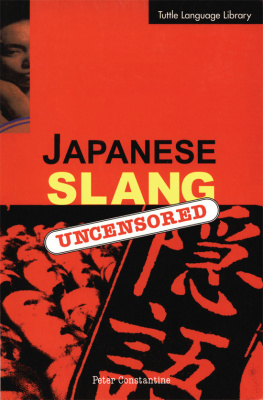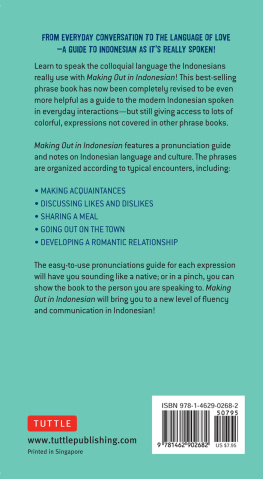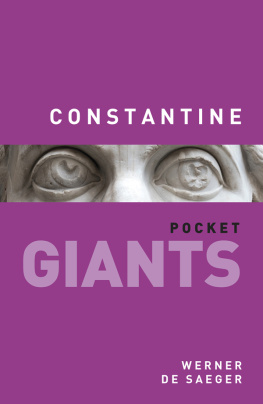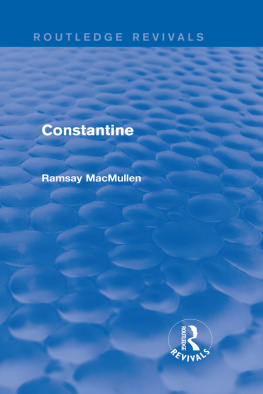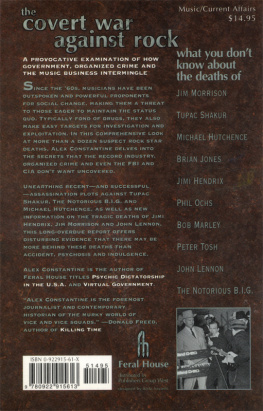Peter Constantine - Japanese Slang: Uncensored
Here you can read online Peter Constantine - Japanese Slang: Uncensored full text of the book (entire story) in english for free. Download pdf and epub, get meaning, cover and reviews about this ebook. year: 1994, publisher: Yenbooks, genre: Science / Home and family. Description of the work, (preface) as well as reviews are available. Best literature library LitArk.com created for fans of good reading and offers a wide selection of genres:
Romance novel
Science fiction
Adventure
Detective
Science
History
Home and family
Prose
Art
Politics
Computer
Non-fiction
Religion
Business
Children
Humor
Choose a favorite category and find really read worthwhile books. Enjoy immersion in the world of imagination, feel the emotions of the characters or learn something new for yourself, make an fascinating discovery.
- Book:Japanese Slang: Uncensored
- Author:
- Publisher:Yenbooks
- Genre:
- Year:1994
- Rating:3 / 5
- Favourites:Add to favourites
- Your mark:
- 60
- 1
- 2
- 3
- 4
- 5
Japanese Slang: Uncensored: summary, description and annotation
We offer to read an annotation, description, summary or preface (depends on what the author of the book "Japanese Slang: Uncensored" wrote himself). If you haven't found the necessary information about the book — write in the comments, we will try to find it.
Japanese Slang: Uncensored — read online for free the complete book (whole text) full work
Below is the text of the book, divided by pages. System saving the place of the last page read, allows you to conveniently read the book "Japanese Slang: Uncensored" online for free, without having to search again every time where you left off. Put a bookmark, and you can go to the page where you finished reading at any time.
Font size:
Interval:
Bookmark:

Japanese Slang
Published by Tuttle Publishing, an imprint of Periplus Editions (HK) Ltd., with editorial offices at 364 Innovation Drive, North Clarendon, VT 05759 U.S.A. and 61 Tai Seng Avenue, #02-12, Singapore 534167.
Copyright 1994 Charles E. Tuttle Publishing Company, Inc.
All rights reserved.
No part of this book may be reproduced or utilized in any form or by any means, electronic or mechanical, including photocopying, recording, or by any information storage or retrieval system, without permission in writing from the publisher.
LCC Card No. 94-60020
ISBN: 978-1-4629-0477-8 (ebook)
First edition, 1994
Distributed by:
North America, Latin America & Europe
Tuttle Publishing
364 Innovation Drive, North Clarendon, VT 05759-9436
Tel: (802) 773 8930; Fax: (802) 773 6993
Email; info@tuttlepublishing.com
www.tuttlepublishing.com
Japan
Tuttle Publishing
Yaekari Bldg., 3F, 5-4-12 Osaki, Shinagawa-ku
Tokyo 141 0032
Tel: (03) 5437 0171; Fax: (03) 5437 0755
Email: tuttle-sales@gol.com
Asia Pacific
Berkeley Books Pte. Ltd.
61 Tai Seng Avenue, #02-12, Singapore 534167
Tel; (65) 6280 1330; Fax: (65) 6280 6290
Email: inquiries@periplus.com.sg
www.periplus.com
1 0 09 08 07 06 12 11 10 9 8 7
Printed in Singapore
TUTTLE PUBLISHING is a registered trademark of Tuttle Publishing, a division of Periplus Editions (HK) Ltd.
Acknowledgments
I WOULD like to express my deepest gratitude to the many individuals who over the years have provided me with the candid cultural information and the plain-spoken language data that were necessary for this book. I am especially grateful for the frankness with which they faced my grueling interrogations and for their generosity in offering to discuss private, personal, and often sensitive aspects of their life and work. Because of the delicate nature of their trade, many of the individuals who have contributed most to this book, have wished to remain incognito.
Among my American friends, I owe the greatest thanks to Burton Pike for his encouragement and inspiration, and for his constant advice and help. I am also grateful to my literary agent, Raphael Pallais, whose interest in medieval Japan proved to be most valuable, and to my editor Sally Schwager, whose profound knowledge of Japanese language and culture has been of great help.
I am grateful to Mark Peterson for sharing his intimate knowledge of the ins and outs of the New York street scene and its language. His analytic discussions of American street life helped me put my Japanese data into a Western perspective.
Among my Japanese friends, I owe special thanks to K. Inoue for the hours of sifting, dissecting, and analyzing the stacks of information that came pouringin, and to W. Ishida for our many frank discussions and for the many investigations that she tackled on my behalf. I am also thankful to N. Ichizono for her generous help, and to T. Yoshioka for her enthusiasm, encouragement, and for the fact-finding expeditions that she undertook.
I am especially grateful to the individuals who helped me in my research into slang expressions of ethnic Korean and Chinese extraction: I would like to thank L. Kim, S. Yang, and J. Ma, and Mr. Park, whose intimate knowledge of both the Korean and the Japanese scene helped me track the etymology of some of the more sinuous Japanese-Korean expressions.
Finally, a very special word of thanks to Dr. Lundquist, Chief Librarian of the Oriental Division of the New York Public Library, and to Ms. Kim, Section Head of the East Asian Division, whose scholarly council and advice on Japanese and Korean publications were of great help.
Introduction
CURIOUS FOREIGNERS who prowl the darkest alleys of Tokyo, who dart into secret red-light bars in Osaka, or bolt up the stairs of the corrugated slum brothels near the port of Yokohama, quickly realize that there is much more to the Japanese language than meets the ear. What they have stumbled on are Japan's fascinating secret languages: the ingo (hidden words) or ago (jaw) used by looters, car heisters, prostitutes, pimps, bag snatchers, muggers, and wallet swipers. As one descends deeper and deeper into the Japanese underworld, the language becomes more potent and rich in clandestine trade words and covert metaphors.
At the street level, everyone uses the same rough and unbridled slang. But by the time the sub rosa crowd secretly congregates in its back-alley clubs and bars, each group slips into its own exclusive, razorfine argot. Secrecy is of paramount importance: delicate heists need to be mapped out, strategies analyzed, financial matters discussed, illegitimate meetings set up, and bands of looters returning from a successful stint might want to recap their triumph over a few loud and festive drinks. What, however, if the person who is quietly nursing a drink at the end of the bar is aorian undercover cop?
One wrong word can unleash a shower of handcuffs.
It has been this professional need for utter discretion that has played the most important role in the fast-paced development of Japan's hidden languages. A careful criminal will linguistically only trust his or her closest peers, which is why bagsnatcherese is so different from pickpocketese, and why brothel, sex-bathhouse, and massage-parlor talk, although closely related, will veer off and become unintelligible when hot technicalities are broached.
Another important reason for the heated development of underworld slang has been the day-to-day need for special criminal trade expressions. Japanese looter slang, for instance, stocks its lexicon with long lists of labyrinthine terms, ranging from hundreds of nouns for house doors and alarm systems to verbs covering every conceivable method of breaking and entering. The lock specialists, on the other hand, have a name for every segment of a lock or a bolt, and strings of exotic words for lock-picking needles, master keys, and the top, bottom, or side sections of tumbler pins. Pickpocketing verbs can name every larcenous flick of the wrist, and special nouns specify wallets by their position in a pocket, their size, the visibility of their outline through the trouser material, the degree of their emptiness or fullness, and whether they are brimming over with bills, or merely heavy with small change.
The other important initiative behind the growth of Japan's secret slang has been the herd instinct, defined in trendy Japanese as uii-izumu (we-ism). Japanese criminals prefer to operate out of an association or gang, in which private language or jargon becomes the invisible club badge. To be one of the boys you first of all have to speak like one of the boys. When teenage roughnecks are initiated into the bottom ranks of a gang they frantically imitate the dashing language of their power-wielding elders, who themselves had imitated the locution of their elders. When youngsters join a criminal association they immediately cleanse their vocabulary of all trendy English words and jingly adolescent expressions, and adopt the gang's tough and mature vernacular. It is this orthodox traditionalism in the Japanese under-world that has led it to conserve long-forgotten medieval and even pre-medieval expressions. A shintabukuro (money sack) is still a wallet on Tokyo's streets, just as it used to be in the good old samurai days, and a shintagamari (from shinta kamari, the money lunges in) is still a wallet that is brimming over with cash. Some groups call a snooping policeman Sakubei, the name of some medieval lawman, while a long-forgotten idiot, Kinj
Font size:
Interval:
Bookmark:
Similar books «Japanese Slang: Uncensored»
Look at similar books to Japanese Slang: Uncensored. We have selected literature similar in name and meaning in the hope of providing readers with more options to find new, interesting, not yet read works.
Discussion, reviews of the book Japanese Slang: Uncensored and just readers' own opinions. Leave your comments, write what you think about the work, its meaning or the main characters. Specify what exactly you liked and what you didn't like, and why you think so.

